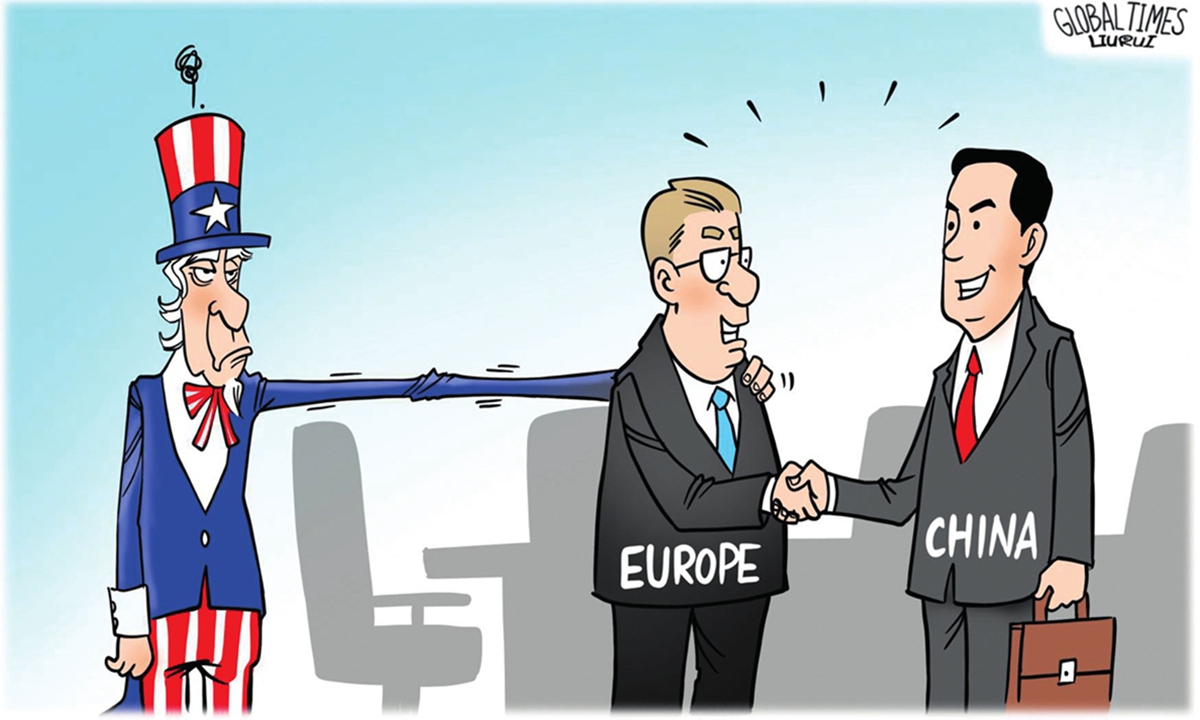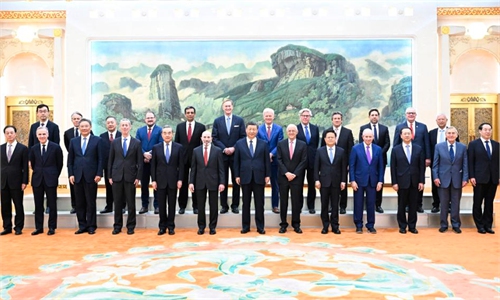Key facts clearer by comparing China-Europe, US-Europe interactions: Global Times editorial

Illustration: Liu Rui/GT
High-level interactions between China and Europe have been relatively frequent recently. Chinese Commerce Minister Wang Wentao is on his Europe tour, visiting France now and Italy on April 12. A few days later, German Chancellor Olaf Scholz will travel to China with a large business delegation.
Meanwhile, it has also been noticed that there are quite a few interactions between the US and Europe lately. The US-EU ministerial meeting of the Trade and Technology Council just concluded, and a US government official, who's responsible for implementing export controls, is reportedly visiting the Netherlands on Monday local time. Although China's development of relations with Europe has always had its own pace, some foreign media outlets will always create the narrative that both China and the US are "courting" Europe.
Comparing the interactions between China and Europe with those between the US and Europe may not necessarily be a bad thing. On the contrary, it helps us see some key facts more clearly.
According to the European edition of US magazine Politico, during the recent ministerial meeting of the Trade and Technology Council, Washington was pushing to "put China in the text every two sentences," said one European diplomat who spoke anonymously. "It kept hammering on the Chinese nail." At the same time European capitals pushed to tone down the language against a country with which they're eager to keep business ties. Although China was only mentioned three times in the final joint statement, it was clear that this process left Europe feeling uncomfortable.
As for the US export policy official visiting the Netherlands, it was not for friendly discussions as Western media used the term "pressure." For the Dutch government, whether to comply with US demands to stop providing after-sales services of certain products to Chinese customers is a "diplomatic and commercial dilemma." If this is considered the US "courting" Europe, then it is clearly a position of superiority. The US is causing pain to Europe, equivalent to cutting flesh in terms of interests, which is also humiliating in terms of diplomacy. The US may be aware that its actions could create rifts in its ties with Europe, but it continues to go on its own way, and the reasons behind this are even more intriguing.
China, of course, also values its relationship with Europe, but the goal is to expand cooperation between China and Europe, which is not targeted at any third party. At the same time, efforts are being made to address differences between the two sides with dialogue and communication. China has never demanded that Europe "put US in the text every two sentences."
Between China and Europe, there is a relationship of mutual respect and equality. China will not allow Europe to feel "being caught in the middle." Dutch Prime Minister Mark Rutte's recent visit to China was very pleasant. He visited the Dashilan in Beijing and stated that "decoupling" is not an option for the Dutch government. Some details have been deliberately ignored by certain American media outlets in their reporting, but Europe is aware of them.
Just a couple of days ago, US Trade Representative Katherine Tai reminded Europe in Brussels, proclaiming the need to jointly address the "challenges" posed by China's economic model to the US and Europe economic system. This is a typical rhetoric from Washington, hypocritically referring to Europe as its ally while shaping China as their common adversary, ultimately aiming to make Europe a stepping stone in its strategy toward China. Has Washington ever truly treated Europe as its ally? Previously, there was the trade war initiated by the Donald Trump administration against Europe, and now there's the Biden administration's Inflation Reduction Act. Has Europe not suffered enough from the US?
As for the interaction between China and Europe, there is competition, however, cooperation far outweighs competition; there are differences between them, but consensus is far more common than differences. China has great patience in properly handling its differences with Europe and always seeks to enhance understanding through constructive dialogue. Despite the EU's unreasonable initiation of an anti-subsidy investigation into Chinese electric vehicles (EVs), China still actively communicates with Europe and promotes the resolution of some specific issues with a proactive attitude, which itself represents goodwill and a responsible attitude. There are no fundamental conflicts of interest or geopolitical strategic contradictions between China and Europe. The correct positioning of China-Europe relations should be that of partners. It is the US that has been pushing Europe toward becoming a strategic competitor with China, as it is least interested in Europe having strategic autonomy.
Some people in the US and Europe always say that China is trying to "divide" the US and Europe, which is ridiculous. If the "de-risking" pursued by the US and Europe targets the part of China-Europe cooperation and mutual benefit, then China certainly has reason to oppose it. Some in Europe suggest whether this can be an opportunity to compel China to "make concessions" in China-Europe relations. This view is also shortsighted, as it underestimates the scope of China-Europe cooperation. There is vast potential for China-Europe cooperation, and we hope that the European side will meet China halfway, quickly overcoming the obstacles in China-Europe relations. This is not only about the interests of China and Europe but also concerns world peace, stability and prosperity.

